
Want to create or adapt books like this? Learn more about how Pressbooks supports open publishing practices.

41 Bertrand Russell–two essays
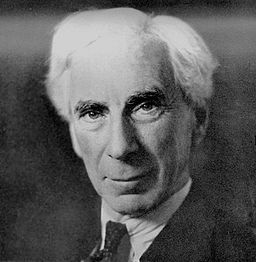
Bertrand Arthur William Russell, 3rd Earl Russell , 1872 – 1970 CE, was a British philosopher, writer, social critic and political activist. In the early 20th century, Russell led the British “revolt against idealism”. He is considered one of the founders of analytic philosophy. Russell was an anti-war activist and went to prison for his pacifism during World War I. He did conclude that the war against Adolf Hitler was a necessary “lesser of two evils” He won the Nobel Prize in Literature in 1950 “”in recognition of his varied and significant writings in which he champions humanitarian ideals and freedom of thought.”
In “Reflections on My Eightieth Birthday” (“Postscript” in his Autobiography ), Russell wrote: “I have lived in the pursuit of a vision, both personal and social.
Personal: to care for what is noble, for what is beautiful, for what is gentle; to allow moments of insight to give wisdom at more mundane times.
Social: to see in imagination the society that is to be created, where individuals grow freely, and where hate and greed and envy die because there is nothing to nourish them. These things I believe, and the world, for all its horrors, has left me unshaken”.
You might find it interesting to see the two things that he believed he would like to say to a future generation. It takes less than 2 minutes, but in 1959, this is what Bertrand Russell had to say:
Message to Future Generations
From Bertrand Russell’s: The Problems of Philosophy: Chapter XV: The Value of Philosophy
This is a short interview with Woodrow Wyatt in 1960, when Russell was 87 years old.
Mankind’s Future and Philosophy
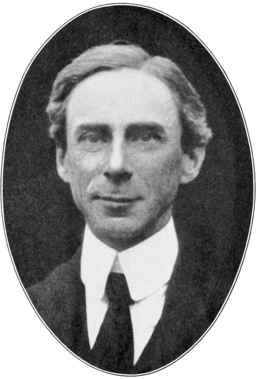
The life of the instinctive man is shut up within the circle of his private interests : family and friends may be included, but the outer world is not regarded except as it may help or hinder what comes within the circle of instinctive wishes. In such a life there is something feverish and confined, in comparison with which the philosophic life is calm and free. The private world of instinctive interests is a small one, set in the midst of a great and powerful world which must, sooner or later, lay our private world in ruins.
Unless we can so enlarge our interests as to include the whole outer world, we remain like a garrison in a beleaguered fortress, knowing that the enemy prevents escape and that ultimate surrender is inevitable. In such a life there is no peace, but a constant strife between the insistence of desire and the powerlessness of will. In one way or another, if our life is to be great and free, we must escape this prison and this strife.
One way of escape is by philosophic contemplation. Philosophic contemplation does not, in its widest survey, divide the universe into two hostile camps—friends and foes, helpful and hostile, good and bad—it views the whole impartially. Philosophic contemplation, when it is unalloyed, does not aim at proving that the rest of the universe is akin to man. All acquisition of knowledge is an enlargement of the Self, but this enlargement is best attained when it is not directly sought. It is obtained when the desire for knowledge is alone operative, by a study which does not wish in advance that its objects should have this or that character, but adapts the Self to the characters which it finds in its objects. This enlargement of Self is not obtained when, taking the Self as it is, we try to show that the world is so similar to this Self that knowledge of it is possible without any admission of what seems alien. The desire to prove this is a form of self-assertion and, like all self-assertion, it is an obstacle to the growth of Self which it desires, and of which the Self knows that it is capable. Self-assertion, in philosophic speculation as elsewhere, views the world as a means to its own ends; thus it makes the world of less account than Self, and the Self sets bounds to the greatness of its goods. In contemplation, on the contrary, we start from the not-Self, and through its greatness the boundaries of Self are enlarged; through the infinity of the universe the mind which contemplates it achieves some share in infinity.
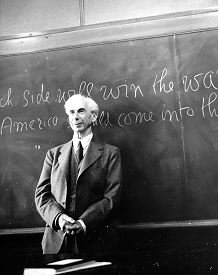
The true philosophic contemplation, on the contrary, finds its satisfaction in every enlargement of the not-Self, in everything that magnifies the objects contemplated, and thereby the subject contemplating. Everything, in contemplation, that is personal or private, everything that depends upon habit, self-interest, or desire, distorts the object, and hence impairs the union which the intellect seeks. By thus making a barrier between subject and object, such personal and private things become a prison to the intellect. The free intellect will see as God might see, without a here and now, without hopes and fears, without the trammels of customary beliefs and traditional prejudices, calmly, dispassionately, in the sole and exclusive desire of knowledge—knowledge as impersonal, as purely contemplative, as it is possible for man to attain. Hence also the free intellect will value more the abstract and universal knowledge into which the accidents of private history do not enter, than the knowledge brought by the senses, and dependent, as such knowledge must be, upon an exclusive and personal point of view and a body whose sense organs distort as much as they reveal.
The mind which has become accustomed to the freedom and impartiality of philosophic contemplation will preserve something of the same freedom and impartiality in the world of action and emotion. It will view its purposes and desires as parts of the whole, with the absence of insistence that results from seeing them as infinitesimal fragments in a world of which all the rest is unaffected by any one man’s deeds. The impartiality which, in contemplation, is the unalloyed desire for truth, is the very same quality of mind which, in action, is justice, and in emotion is that universal love which can be given to all, and not only to those who are judged useful or admirable. Thus contemplation enlarges not only the objects of our thoughts, but also the objects of our actions and our affections: it makes us citizens of the universe, not only of one walled city at war with all the rest. In this citizenship of the universe consists man’s true freedom, and his liberation from the thralldom of narrow hopes and fears.
Key Takeaway
The whole problem with the world is that fools and fanatics are always so certain of themselves, but wiser people so full of doubts.
Bertrand Russell
Thus, to sum up our discussion of the value of philosophy; Philosophy is to be studied , not for the sake of any definite answers to its questions, since no definite answers can, as a rule, be known to be true, but rather for the sake of the questions themselves; because these questions enlarge our conception of what is possible, enrich our intellectual imagination and diminish the dogmatic assurance which closes the mind against speculation; but above all because, through the greatness of the universe which philosophy contemplates, the mind also is rendered great, and becomes capable of that union with the universe which constitutes its highest good.

Ex Libris C. K. OGDEN CONWAY MEMORIAL LECTURE

FREE THOUGHT AND OFFICIAL PROPAGANDA
Delivered at south place institute on march 24, 1922, by the hon. bertrand russell, m.a., f.r.s., (professor graham wallas in the chair), watts & co., johnson’s court, fleet street, e.c.4 1922.
Moncure Conway, in whose honor we are assembled to-day, devoted his life to two great objects: freedom of thought and freedom of the individual.
“In regard to both these objects, something has been gained since his time, but something also has been lost. New dangers, somewhat different in form from those of past ages, threaten both kinds of freedom, and unless a vigorous and vigilant public opinion can be aroused in defense of them, there will be much less of both a hundred years hence than there is now. My purpose in this address is to emphasize the new dangers and to consider how they can be met.
Let us begin by trying to be clear as to what we mean by “free thought.” This expression has two senses.
In its narrower sense it means thought which does not accept the dogmas of traditional religion. In this sense a man is a “free thinker” if he is not a Christian or a Mussulman or a Buddhist or a Shintoist or a member of any of the other bodies of men who accept some inherited orthodoxy. In Christian countries a man is called a “free thinker” if he does not decidedly believe in God, though this would not suffice to make a man a “free thinker” in a Buddhist country.
I do not wish to minimize the importance of free thought in this sense. I am myself a dissenter from all known religions, and I hope that every kind of religious belief will die out. I do not believe that, on the balance, religious belief has been a force for good. Although I am prepared to admit that in certain times and places it has had some good effects, I regard it as belonging to the infancy of human reason, and to a stage of development which we are now outgrowing.
But there is also a wider sense of “free thought,” which I regard as of still greater importance. Indeed, the harm done by traditional religions seems chiefly traceable to the fact that they have prevented free thought in this wider sense. The wider sense is not so easy to define as the narrower, and it will be well to spend some little time in trying to arrive at its essence.
To begin with the most obvious. Thought is not “free” when legal penalties are incurred by the holding or not holding of certain opinions, or by giving expression to one’s belief or lack of belief on certain matters. Very few countries in the world have as yet even this elementary kind of freedom.
In England, under the Blasphemy Laws , it is illegal to express disbelief in the Christian religion, though in practice the law is not set in motion against the well-to-do. It is also illegal to teach what Christ taught on the subject of non-resistance. Therefore, whoever wishes to avoid becoming a criminal must profess to agree with Christ’s teaching, but must avoid saying what that teaching was.
In America no one can enter the country without first solemnly declaring that he disbelieves in anarchism and polygamy; and, once inside, he must also disbelieve in communism.
In Japan it is illegal to express disbelief in the divinity of the Mikado . It will thus be seen that a voyage round the world is a perilous adventure.
A Mohammedan, a Tolstoyan, a Bolshevik, or a Christian cannot undertake it without at some point becoming a criminal, or holding his tongue about what he considers important truths. This, of course, applies only to steerage passengers; saloon passengers are allowed to believe whatever they please, provided they avoid offensive obtrusiveness.
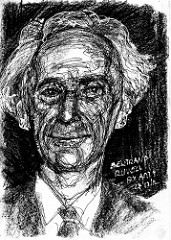
Legal penalties are, however, in the modern world, the least of the obstacles to freedom of thoughts . The two great obstacles are economic penalties and distortion of evidence. It is clear that thought is not free if the profession of certain opinions makes it impossible to earn a living. It is clear also that thought is not free if all the arguments on one side of a controversy are perpetually presented as attractively as possible, while the arguments on the other side can only be discovered by diligent search. Both these obstacles exist in every large country known to me, except China, which is the last refuge of freedom. It is these obstacles with which I shall be concerned—their present magnitude, the likelihood of their increase, and the possibility of their diminution.
We may say that thought is free when it is exposed to free competition among beliefs —i.e., when all beliefs are able to state their case, and no legal or pecuniary advantages or disadvantages attach to beliefs. This is an ideal which, for various reasons, can never be fully attained. But it is possible to approach very much nearer to it than we do at present.

Three incidents in my own life will serve to show how, in modern England, the scales are weighted in favor of Christianity. My reason for mentioning them is that many people do not at all realize the disadvantages to which avowed Agnosticism still exposes people.
- The first incident belongs to a very early stage in my life. My father was a Freethinker, but died when I was only three years old. Wishing me to be brought up without superstition, he appointed two Freethinkers as my guardians. The Courts, however, set aside his will, and had me educated in the Christian faith. I am afraid the result was disappointing, but that was not the fault of the law. If he had directed that I should be educated as a Christadelphian or a Muggletonian or a Seventh-Day Adventist, the Courts would not have dreamed of objecting. A parent has a right to ordain that any imaginable superstition shall be instilled into his children after his death, but has not the right to say that they shall be kept free from superstition if possible.
- The second incident occurred in the year 1910 . I had at that time a desire to stand for Parliament as a Liberal, and the Whips recommended me to a certain constituency. I addressed the Liberal Association, who expressed themselves favorably, and my adoption seemed certain. But, on being questioned by a small inner caucus, I admitted that I was an Agnostic. They asked whether the fact would come out, and I said it probably would. They asked whether I should be willing to go to church occasionally, and I replied that I should not. Consequently, they selected another candidate, who was duly elected, has been in Parliament ever since, and is a member of the present Government.
- The third incident occurred immediately afterwards. I was invited by Trinity College, Cambridge, to become a lecturer, but not a Fellow. The difference is not pecuniary; it is that a Fellow has a voice in the government of the College, and cannot be dispossessed during the term of his Fellowship except for grave immorality. The chief reason for not offering me a Fellowship was that the clerical party did not wish to add to the anti-clerical vote. The result was that they were able to dismiss me in 1916, when they disliked my views on the War. If I had been dependent on my lectureship, I should have starved.
These three incidents illustrate different kinds of disadvantages attaching to avowed freethinking even in modern England. Any other avowed Freethinker could supply similar incidents from his personal experience, often of a far more serious character. The net result is that people who are not well-to-do dare not be frank about their religious beliefs.
It is not, of course, only or even chiefly in regard to religion that there is lack of freedom. Belief in communism or free love handicaps a man much more than Agnosticism. Not only is it a disadvantage to hold those views, but it is very much more difficult to obtain publicity for the arguments in their favor. On the other hand, in Russia the advantages and disadvantages are exactly reversed: comfort and power are achieved by professing Atheism, communism, and free love, and no opportunity exists for propaganda against these opinions. The result is that in Russia one set of fanatics feels absolute certainty about one set of doubtful propositions, while in the rest of the world another set of fanatics feels equal certainty about a diametrically opposite set of equally doubtful propositions. From such a situation war, bitterness, and persecution inevitably result on both sides.
Russell was an atheist. He has specific reasons for this. Listen to it in his own words:
Bertrand Russell on Religion
William James used to preach the “will to believe.” For my part, I should wish to preach the “will to doubt.” None of our beliefs are quite true; all have at least a penumbra of vagueness and error. The methods of increasing the degree of truth in our beliefs are well known; they consist in hearing all sides, trying to ascertain all the relevant facts, controlling our own bias by discussion with people who have the opposite bias, and cultivating a readiness to discard any hypothesis which has proved inadequate. These methods are practiced in science, and have built up the body of scientific knowledge.
Every man of science whose outlook is truly scientific is ready to admit that what passes for scientific knowledge at the moment is sure to require correction with the progress of discovery; nevertheless, it is near enough to the truth to serve for most practical purposes, though not for all. In science, where alone something approximating to genuine knowledge is to be found, men’s attitude is tentative and full of doubt.
In religion and politics, on the contrary, though there is as yet nothing approaching scientific knowledge , everybody considers it de rigueur to have a dogmatic opinion, to be backed up by inflicting starvation, prison, and war, and to be carefully guarded from argumentative competition with any different opinion. If only men could be brought into a tentatively agnostic frame of mind about these matters, nine-tenths of the evils of the modern world would be cured. War would become impossible, because each side would realize that both sides must be in the wrong. Persecution would cease. Education would aim at expanding the mind, not at narrowing it. Men would be chosen for jobs on account of fitness to do the work, not because they flattered the irrational dogmas of those in power. Thus rational doubt alone, if it could be generated, would suffice to introduce the millennium.
We have had in recent years a brilliant example of the scientific temper of mind in the theory of relativity and its reception by the world. Einstein, a German-Swiss-Jew pacifist, was appointed to a research professorship by the German Government in the early days of the War; his predictions were verified by an English expedition which observed the eclipse of 1919, very soon after the Armistice. His theory upsets the whole theoretical framework of traditional physics; it is almost as damaging to orthodox dynamics as Darwin was to Genesis . Yet physicists everywhere have shown complete readiness to accept his theory as soon as it appeared that the evidence was in its favor. But none of them, least of all Einstein himself, would claim that he has said the last word. He has not built a monument of infallible dogma to stand for all time. There are difficulties he cannot solve; his doctrines will have to be modified in their turn as they have modified Newton’s. This critical un-dogmatic receptiveness is the true attitude of science.
![bertrand russell essays Albert Einstein during a lecture in Vienna in 1921 by Ferdinand Schmutzer [Public domain], via Wikimedia Commons](https://mlpp.pressbooks.pub/app/uploads/sites/194/2018/02/256px-Einstein_1921_by_F_Schmutzer_-_restoration-229x300.jpg)
What is wanted is not the will to believe, but the wish to find out, which is its exact opposite.
If it is admitted that a condition of rational doubt would be desirable , it becomes important to inquire how it comes about that there is so much irrational certainty in the world. A great deal of this is due to the inherent irrationality and credulity of average human nature. But this seed of intellectual original sin is nourished and fostered by other agencies, among which three play the chief part—namely, education, propaganda, and economic pressure .
Let us consider these in turn.
The committee which framed these laws, as quoted by the New Republic , laid it down that the teacher who “does not approve of the present social system……must surrender his office,” and that “no person who is not eager to combat the theories of social change should be entrusted with the task of fitting the young and old for the responsibilities of citizenship.”
Thus, according to the law of the State of New York, Christ and George Washington were too degraded morally to be fit for the education of the young . If Christ were to go to New York and say, “Suffer the little children to come unto me,” the President of the New York School Board would reply: “Sir, I see no evidence that you are eager to combat theories of social change. Indeed, I have heard it said that you advocate what you call the kingdom of heaven, whereas this country, thank God, is a republic. It is clear that the Government of your kingdom of heaven would differ materially from that of New York State, therefore no children will be allowed access to you.” If he failed to make this reply, he would not be doing his duty as a functionary entrusted with the administration of the law.
The effect of such laws is very serious. Let it be granted, for the sake of argument, that the government and the social system in the State of New York are the best that have ever existed on this planet; yet even then both would presumably be capable of improvement. Any person who admits this obvious proposition is by law incapable of teaching in a State school. Thus the law decrees that the teachers shall all be either hypocrites or fools.
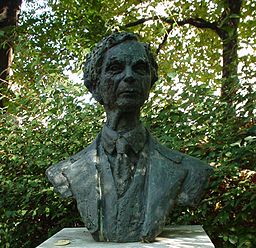
Religious toleration, to a certain extent, has been won because people have ceased to consider religion so important as it was once thought to be. But in politics and economics, which have taken the place formerly occupied by religion, there is a growing tendency to persecution, which is not by any means confined to one party. The persecution of opinion in Russia is more severe than in any capitalist country. I met in Petrograd an eminent Russian poet, Alexander Block, who has since died as the result of privations. The Bolsheviks allowed him to teach æsthetics, but he complained that they insisted on his teaching the subject “from a Marxian point of view.” He had been at a loss to discover how the theory of rhythmics was connected with Marxism, although, to avoid starvation, he had done his best to find out. Of course, it has been impossible in Russia ever since the Bolsheviks came into power to print anything critical of the dogmas upon which their regime is founded.
The examples of America and Russia illustrate the conclusion to which we seem to be driven—namely, that so long as men continue to have the present fanatical belief in the importance of politics free thought on political matters will be impossible, and there is only too much danger that the lack of freedom will spread to all other matters, as it has done in Russia. Only some degree of political skepticism can save us from this misfortune.
It must not be supposed that the officials in charge of education desire the young to become educated. On the contrary, their problem is to impart information without imparting intelligence. Education should have two objects: first, to give definite knowledge—reading and writing, languages and mathematics, and so on; secondly, to create those mental habits which will enable people to acquire knowledge and form sound judgments for themselves. The first of these we may call information, the second intelligence. The utility of information is admitted practically as well as theoretically; without a literate population a modern State is impossible. But the utility of intelligence is admitted only theoretically, not practically; it is not desired that ordinary people should think for themselves, because it is felt that people who think for themselves are awkward to manage and cause administrative difficulties. Only the guardians, in Plato’s language, are to think; the rest are to obey, or to follow leaders like a herd of sheep. This doctrine, often unconsciously, has survived the introduction of political democracy, and has radically vitiated all national systems of education.
![bertrand russell essays This Mikado's Empire, His Imperial Japanese Majesty, Mutsuhito, Emperor of Japan, and the 123d Mikado of the By Internet Archive Book Images [No restrictions], via Wikimedia Commons.,](https://mlpp.pressbooks.pub/app/uploads/sites/194/2018/02/The_mikados_empire_1894_14597610288-203x300.jpg)
Definite mis-statements of fact can be legitimately objected to, but they are by no means necessary. The mere words “Pear’s Soap,” which affirm nothing, cause people to buy that article. If, wherever these words appear, they were replaced by the words “The Labour Party,” millions of people would be led to vote for the Labour Party, although the advertisements had claimed no merit for it whatever. But if both sides in a controversy were confined by law to statements which a committee of eminent logicians considered relevant and valid, the main evil of propaganda, as at present conducted, would remain.
Suppose, under such a law, two parties with an equally good case, one of whom had a million pounds to spend on propaganda, while the other had only a hundred thousand . It is obvious that the arguments in favor of the richer party would become more widely known than those in favor of the poorer party, and therefore the richer party would win. This situation is, of course, intensified when one party is the Government. In Russia the Government has an almost complete monopoly of propaganda, but that is not necessary. The advantages which it possesses over its opponents will generally be sufficient to give it the victory, unless it has an exceptionally bad case.
There are two simple principles which, if they were adopted, would solve almost all social problems.
The first is that education should have for one of its aims to teach people only to believe propositions when there is some reason to think that they are true.
The second is that jobs should be given solely for fitness to do the work.
To take the second point first . The habit of considering a man’s religious, moral, and political opinions before appointing him to a post or giving him a job is the modern form of persecution, and it is likely to become quite as efficient as the Inquisition ever was. The old liberties can be legally retained without being of the slightest use. If, in practice, certain opinions lead a man to starve, it is poor comfort to him to know that his opinions are not punishable by law. There is a certain public feeling against starving men for not belonging to the Church of England, or for holding slightly unorthodox opinions in politics. But there is hardly any feeling against the rejection of Atheists or Mormons, extreme communists, or men who advocate free love. Such men are thought to be wicked, and it is considered only natural to refuse to employ them. People have hardly yet waked up to the fact that this refusal, in a highly industrial State, amounts to a very rigorous form of persecution.
If this danger were adequately realized, it would be possible to rouse public opinion , and to secure that a man’s beliefs should not be considered in appointing him to a post. The protection of minorities is vitally important; and even the most orthodox of us may find himself in a minority some day, so that we all have an interest in restraining the tyranny of majorities. Nothing except public opinion can solve this problem. Socialism would make it somewhat more acute, since it would eliminate the opportunities that now arise through exceptional employers. Every increase in the size of industrial undertakings makes it worse, since it diminishes the number of independent employers.
The battle must be fought exactly as the battle of religious toleration was fought. And as in that case, so in this, a decay in the intensity of belief is likely to prove the decisive factor. While men were convinced of the absolute truth of Catholicism or Protestantism, as the case might be, they were willing to persecute on account of them. While men are quite certain of their modern creeds, they will persecute on their behalf. Some element of doubt is essential to the practice, though not to the theory, of toleration.
And this brings me to my other point, which concerns the aims of education. If there is to be toleration in the world, one of the things taught in schools must be the habit of weighing evidence, and the practice of not giving full assent to propositions which there is no reason to believe true.
![bertrand russell essays By Hilo Tribune, March 21, 1905 [Public domain], via Wikimedia Commons](https://mlpp.pressbooks.pub/app/uploads/sites/194/2018/02/Kilauea_Volcano_Eruption_Newspaper_Page.jpg)
History should be taught in the same way. Napoleon’s campaigns of 1813 and 1814, for instance, might be studied in the Moniteur , leading up to the surprise which Parisians felt when they saw the Allies arriving under the walls of Paris after they had (according to the official bulletins) been beaten by Napoleon in every battle. In the more advanced classes, students should be encouraged to count the number of times that Lenin has been assassinated by Trotsky, in order to learn contempt for death. Finally, they should be given a school history approved by the Government, and asked to infer what a French school history would say about our wars with France. All this would be a far better training in citizenship than the trite moral maxims by which some people believe that civic duty can be inculcated.
If I am asked how the world is to be induced to adopt these two maxims—namely
(1) that jobs should be given to people on account of their fitness to perform them;
(2) that one aim of education should be to cure people of the habit of believing propositions for which there is no evidence—
I can only say that it must be done by generating an enlightened public opinion . And an enlightened public opinion can only be generated by the efforts of those who desire that it should exist. I do not believe that the economic changes advocated by Socialists will, of themselves, do anything towards curing the evils we have been considering. I think that, whatever happens in politics, the trend of economic development will make the preservation of mental freedom increasingly difficult, unless public opinion insists that the employer shall control nothing in the life of the employee except his work.
Freedom in education could easily be secured, if it were desired , by limiting the function of the State to inspection and payment, and confining inspection rigidly to the definite instruction. But that, as things stand, would leave education in the hands of the Churches, because, unfortunately, they are more anxious to teach their beliefs than Freethinkers are to teach their doubts. It would, however, give a free field, and would make it possible for a liberal education to be given if it were really desired. More than that ought not to be asked of the law.
My plea throughout this address has been for the spread of the scientific temper , which is an altogether different thing from the knowledge of scientific results. The scientific temper is capable of regenerating mankind and providing an issue for all our troubles. The results of science, in the form of mechanism, poison gas, and the yellow press, bid fair to lead to the total downfall of our civilization. It is a curious antithesis, which a Martian might contemplate with amused detachment. But for us it is a matter of life and death. Upon its issue depends the question whether our grandchildren are to live in a happier world, or are to exterminate each other by scientific methods, leaving perhaps to Negroes and Papuans the future destinies of mankind.
If you would like to hear a more thorough interview with Russell, you can find it here at:
Face to Face Interview with the BBC

Project Gutenberg’s The Problems of Philosophy, by Bertrand Russell
This eBook is for the use of anyone anywhere at no cost and with almost no restrictions whatsoever. You may copy it, give it away or re-use it under the terms of the Project Gutenberg License included with this eBook or online at www.gutenberg.org
Title: The Problems of Philosophy
Author: Bertrand Russell
Release Date: May 2, 2009 [EBook #5827]
Last Updated: February 7, 2013 Language: English
Project Gutenberg’s Free Thought and Official Propaganda, by Bertrand Russell
This eBook is for the use of anyone anywhere at no cost and with almost no restrictions whatsoever. You may copy it, give it away or re-use it under the terms of the Project Gutenberg License included with this eBook or online at www.gutenberg.org/license
Title: Free Thought and Official Propaganda
Release Date: February 16, 2014 [EBook #44932]
Language: English
Bertrand Russell--two essays Copyright © 2018 by Jody L Ondich is licensed under a Creative Commons Attribution-NoDerivatives 4.0 International License , except where otherwise noted.
Share This Book
www.skeptic.ca
Books by Russell, Bertrand (sorted by popularity)
- Sort Alphabetically by Title
- Sort by Release Date
- See also: en.wikipedia
- Displaying results 1–21

- Privacy policy
- About Project Gutenberg
- Terms of Use
- Contact Information


IMAGES
COMMENTS
Oct 25, 2024 · Bertrand Russell, British philosopher and logician, founding figure in the analytic movement in Anglo-American philosophy, and recipient of the 1950 Nobel Prize for Literature. His contributions to logic, epistemology, and the philosophy of mathematics made him one of the foremost philosophers of the 20th century.
This is an online collection of over one hundred books and articles by Bertrand Russell. For a complete list of Russell’s books and articles see our online Russell bibliography. We also maintain a chronology of Russell’s life and an introduction. to his analytic philosophy. I. EARLY ESSAYS BY RUSSELL
Feb 7, 2013 · 41 Bertrand Russell–two essays Bertrand Arthur William Russell, 3rd Earl Russell , 1872 – 1970 CE, was a British philosopher, writer, social critic and political activist. In the early 20th century, Russell led the British “revolt against idealism”.
Worship" in Dec. 1903) is perhaps Bertrand Russell's best known and most reprinted essay. Its mood and language have often been explained, even by Russell himself, as reflecting a particular time in his life; "it depend(s)," he wrote in 1929, "upon a metaphysic which is more platonic than that which I now believe in." Yet the essay
The collection includes essays on the subjects of sociology, ethics and philosophy.In the eponymous essay, Russell displays a series of arguments and reasoning with the aim of stating how the 'belief in the virtue of labour causes great evils in the modern world, and that the road to happiness and prosperity lies instead in a diminution of labour' and how work 'is by no means one of the ...
What I believe Bertrand Russell 342 downloads; The A B C of Relativity Bertrand Russell 300 downloads; Index of the Project Gutenberg Works of Bertrand Russell Bertrand Russell 299 downloads; Proposed Roads to Freedom Bertrand Russell 294 downloads; Political Ideals Bertrand Russell 277 downloads; The Practice and Theory of Bolshevism Bertrand ...